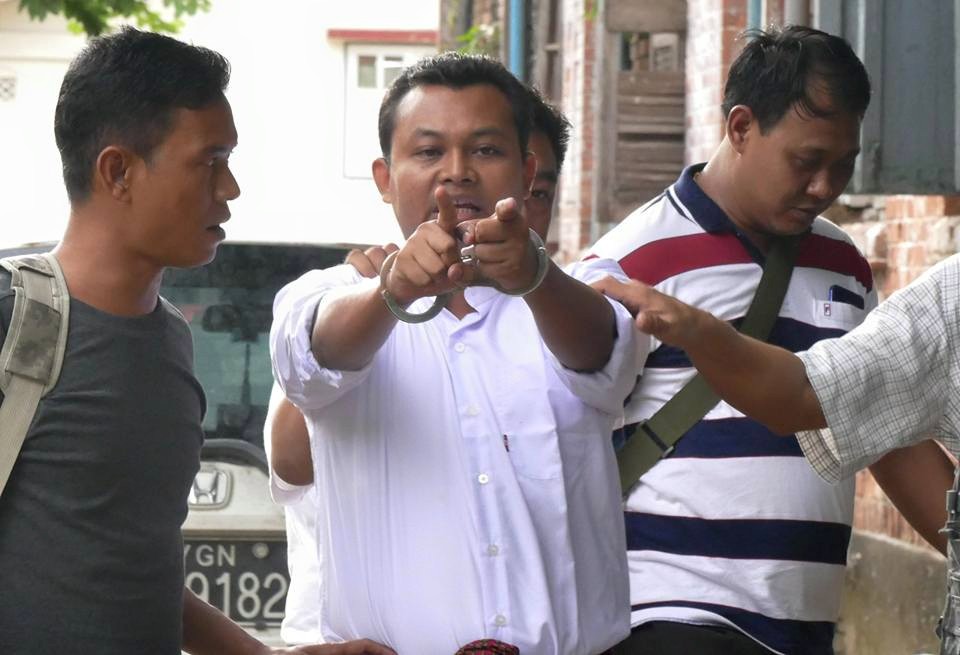A lawsuit against Eleven Media Group (EMG) CEO Than Htut Aung and chief editor Wai Phyo should be dropped immediately, according to right groups calling on Burma’s government to reform the country’s restrictive media laws.
Charges of defamation were laid against the pair last week over an editorial penned by Than Htut Aung that accused an unnamed chief minister of corruption in connection with a development project in Rangoon Division.
Human Rights Watch (HRW) said the Rangoon regional government should immediately drop the case against EMG and initiate an investigation into the corruption allegations to hold lawbreakers accountable.
“What is particularly disturbing is the democratic NLD government is now starting to use some of the same abusive tactics that past military governments used against the media by hauling reporters and editors into court,” Phil Robertson, HRW’s deputy director for Asia, told DVB on Tuesday.
Rangoon Chief Minister Phyo Min Thein, who was the presumed target of the editorial, denied allegations in the editorial that he was gifted a US$100,000 Patek Phillipe wristwatch as a backhander by a property developer.
At a press conference last Wednesday, Phyo Min Thein said that the editorial and a subsequent Facebook post were intended to defame his “personal dignity”. He denied the allegations that he had received a watch as a kickback, stating that he had a “more affordable Rolex watch” bought by his wife.
The lawsuit is being filed under Article 66(d) of the Telecommunications Act for “online defamation”.
“Human Rights Watch unequivocally opposes criminal defamation of any kind because we recognize it’s unacceptable to throw people in prison for what they say,” said Robertson.
“Any limits on freedom of expression must be proportional and fall into clear internationally defined categories, and alleging a government official took a fancy wristwatch is a bribe, or lambasting a ruling party for its poor performance in office, do not fall into those categories,” he added.
The New York-based Committee to Protect Journalists (CPJ) also condemned the move in a statement released yesterday that called on the Burmese authorities to immediately withdraw the defamation charges and release the journalists, who are currently being held in pretrial detention.
“It’s outrageous that journalists should be imprisoned without trial, under a democratically elected government that has promised more press freedom,” Steven Butler, CPJ’s Asia programme coordinator, said in the statement.
CPJ pointed out that neither the article nor the social media post named the minister allegedly involved in corruption, and the Facebook post has since been deleted.
HRW also called for Article 66(d) to be scrapped.
“Section 66d is a disaster for freedom of expression in Myanmar [Burma]. It’s clearly a poorly drafted, overly broad provision of the law that gives wide powers to government officials to criminalize just about any expression they don’t like on the Internet or any telecommunications network,” said Robertson.
Last Friday, a man accused of ridiculing Burma’s military chief and former president on social media was sentenced to two years in prison under Article 66(d), a week after an official of the ruling National League for Democracy appeared in court to face similar charges.
EMG has also used the law to silence critics of the company and its CEO. However, according to local media reports, it has started dropping all defamation charges it has laid under the Telecommunications Law since it became a target of the law last week.
Local media associations, including the Myanmar Press Council, have also played a role in the EMG case, albeit without advocating on behalf of the defendants.
[related]
According to Thiha Saw, the director of the Myanmar Journalism Institute, the council’s complaint committee “is not trying to side with the media house, but trying to be neutral and play by the media law, which says that any issue violating the code of conduct should be handled by the complaint committee of the Press Council”.
He added that the Press Council has mediated in more 200 cases in the past to resolve issues without the need for legal action. “That’s what they are trying to do” in this case, he said. “It may be a correction, an apology, etc. so there is no [need for] legal cases.”
Than Htut Aung and Wai Phyo will remain in Insein prison until a court hearing is held on 25 November.



